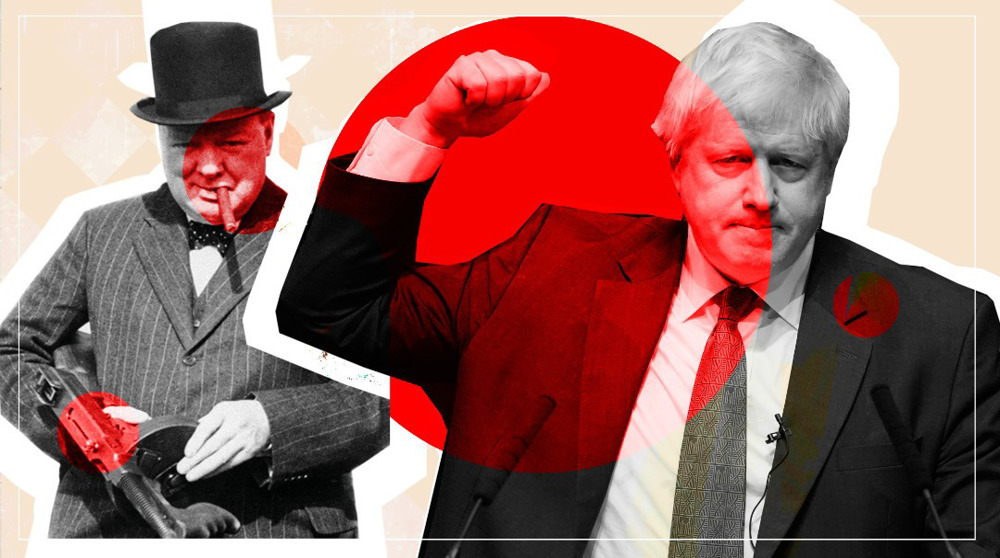New draconian UK crime legislation: Who's afraid of Black Lives Matter?
By John Wight
As expected given its 80-seat majority in the House of Commons, the Johnson government’s Police, Crime, Sentencing and Courts Bill passed into legislation by a comfortable margin of 358 votes in favor and 263 against.
It is one of the most controversial pieces of legislation to be drafted by a British government and be voted through the country’s parliament. A society that has long prided itself on the right to protest, free expression and peaceful dissent, this new legislation places a chill on the right to do so without harassment, arbritary arrest and prosecution, leading to potential fines of up to £10,000.
Despite strong opposition beyond the Commons - opposition catalyzed further by the recent shocking scenes of police officers manhandling and arresting women at a peaceful vigil in London to mark the abduction and brutal murder of Sarah Everard at the beginning of March - the Tories have just handed even more powers to the police.
The aforementioned shocking scenes of women being manhandled by police officers at a vigil were made even more controversial by the fact that the man charged with Ms. Everard’s abduction was a serving London police officer. The man in question, Wayne Couzens, is currently in custody awaiting trial.
On a broader level, this new legislation has been drafted in reaction to the wave of Black Lives Matter protests that erupted across the UK in the wake of the killing of George Floyd, a 46-year-old black man, by white Minneapolis police officer Derek Chauvin on 25 May 2020. The sight of Chauvin with his knee on George Floyd’s neck for almost nine minutes was broadcast and drew condemnation across the world.
In Britain, at the height of the Black Lives Matter protests in response, statues to historical figures associated with the British slave trade, British colonialism and imperialism were attacked, defaced, and in one particular case even toppled. In so doing, the protesters rocked the country’s ruling establishment, fiercely contesting as they were an official history rooted in mythology and fairy tales.
The life and legacy of the country’s most revered leader, Winston Churchill, is a case in point. His statue in Parliament Square adjacent to the Commons was also defaced. In so doing, those responsible cut through the fog of false consciousness by which the British establishment has been able to present Churchill as some kind of hero and savior, instead of the brutal imperialist and white supremacist that he was in truth.
Churchill’s legend revolves around his role as Britain’s prime minister during the most critical year in the country’s history. This was 1940 when, after the military disaster at Dunkirk in the early years of the Second World War, German tanks stood at the Channel ports of northern France and the threat of Nazi invasion loomed large.
Churchill, with his uncommon powers of rhetoric and determination not so much to defend Britain as defend the British Empire, inarguably stiffened the spine of an British Establishment which back then was riddled with fascist sympathies. This extended to members of the Royal Family and newspaper moguls such as Viscount Rothermere, owner of the popular and influential Daily Mail tabloid.
However, when you consider that Adolf Hitler carried in his fascist heart a lifelong admiration for the British Empire, particularly Britain’s colonial possession of India, and that his objective was to emulate it in Eastern Europe and Russia, you begin to understand the power of the adage ‘it takes one to know one’.
Winston Churchill’s belief in racial hierarchy was outlined in the testimony he gave to the Peel Commision in 1937, established to investigate the 1936 Arab revolt against the influx of European Jewish settlers to Palestine with the connivance of the British. When asked about the rights of the indigenous people in Palestine, Churchill refused to accept that they had any: “I do not admit, for example, that a great wrong has been done to the Red Indians of America or the Black people of Australia. I do not admit that wrong has been done to these people by the fact that a stronger race, a higher-grade race, a more worldly wise race, to put it in that way, has come in and taken their place.”
Years previously, as Britain’s secretary for war, Churchill had championed the use chemical weapons to put down rebellion in India and Iraq, writing in a memo: “I am strongly in favour of using poisoned gas against uncivilized tribes.” Also on his charge sheet is the authorization of the use of chemical weapons in Russia in 1919 with the aim, in conjunction with various other imperialist powers, of crushing the Russian Bolshevik Revolution in its infancy.
During the Second World War, Churchill’s supposed finest hour, his disdain for non-white European peoples was laid bare with his culpability in the deaths of three million men, women and children in the Bengal Famine of 1943. Despite the starvation sweeping through this blighted province, Churchill ordered the diversion of desperately needed food from India to Europe. The fact that the 70,000 tons of food exported by the British from India in the first seven months of 1943 would have kept 400,000 people alive for a year is a chilling one. “I hate Indians,” Britain’s most venerated prime minister is said to have told one of his underlings. “They are a beastly people with a beastly religion.”
Churchill was voted out of office at war’s end in 1945 by a British working class whose contempt for this scion of the British aristocracy stood in inverse proportion to the extent to which he is revered by the country’s Brexit working class today. Churchill was far from finished, however, and re-entered Downing Street as prime minister in 1953. It was then he ordered, in conjunction with his US counterpart President Eisenhower, the infamous subversion of Iran’s democratically elected prime minister Mohammad Mossadegh.
Operation Ajax was a joint CIA and MI6 affair, mounted in response to Mossadegh’s decision to nationalize Iran’s oil industry and husband the resulting revenue for the benefit of the Iranian people. As he made clear: “Our long years of negotiations with foreign countries [over a just distribution of oil revenues] have yielded no results… With the oil revenues, we could meet our entire budget and combat poverty, disease, and backwardness among our people.”
Iran’s oil had been taken over by the British decades before under the auspices of the Anglo-Persian Oil Company (APOC), established in 1908 with this purpose in mind. The company changed its name to the Anglo-Iranian Oil Company (AIOC) in 1913, and today is known around the world as British Petroleum (BP).
On the strategic and economic importance of Iranian oil, Churchill proclaimed with customary bombast: “Fortune brought us a prize from fairyland beyond our wildest dreams. Mastery itself was the prize of the venture.” Such an open celebration of the opportunity for national enrichment at another country’s expense is so unabashed it would make a low-rent mafia hood blush.
Taking the above history in hand, Black Lives Matter in the UK should be lauded and applauded rather than vilified and demonized. But then Boris Johnson and his born-to-rule privately educated acolytes know full well that where statues fall the walls of false consciousness may follow.
Thus we have this tawdry and regressive piece of panicked legislation, designed to uphold establishment myths and suppress the truth.
End.
John Wight is an author and political commentator, based in Scotland.
(The views expressed in this article do not necessarily reflect those of Press TV.)
Italy arrests Palestinian activist amid crackdown on anti-Israel voices
VIDEO | Myanmar's capital goes to polls amid civil war, humanitarian crisis
Israeli forces invade Syrian village amid continued aggression
UN experts warn Palestine Action hunger strikers at risk of death
Putin: Russia will use force to achieve goals if Ukraine stalls peace negotiations
The Year That Was: Best of ‘Iran First’ in 2025, the year of major Iranian breakthroughs
German journalist says Israeli forces raped her after abducting her from Gaza flotilla
VIDEO | Press TV's news headlines










 This makes it easy to access the Press TV website
This makes it easy to access the Press TV website